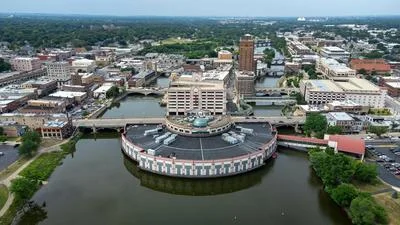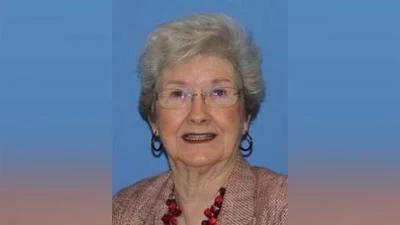City of Geneva Historic Preservation Commission Met Oct. 20.
Here is the minutes provided by the commission:
1. Call to Order
Chairman Zellmer called to order the October 20, 2020 meeting of the Geneva Historic Preservation Commission at 7:00 p.m.
2. Roll Call
Present HPC: Chairman Zellmer; Commissioners Hartman, McManus, Salomon, Warner, Zinke
Absent: Commissioner Stazin
Staff Present: Preservation Planner Michael Lambert
Others Present: Applicant Nancy Lorenz; Mike Schmidt, Schmidt Exteriors, Inc., 1737 E. Wilson, Batavia; Applicants Anton and Maria Malovany, 128 N. Third St., Geneva
3. Chairman’s Comments
Chairman Zellmer read a note from Commissioner Hamilton, who was to announce his resignation at last month’s meeting but the meeting was cancelled. In summary, Commissioner Hamilton extended appreciation to the City for allowing him to serve on the commission and to his fellow commissioners for their individual expertise they offered and for their passion for the City of Geneva. Mr. Hamilton also thanked Historic Preservation Planner Michael Lambert for his work on this commission’s behalf and for his attention to detail to each request, providing a foundation for the commission to base its decisions. While he had no intention of relocating, he and his wife have decided to make it their goal to move back to Geneva when their working lives are over.
New Commissioners Lisa McManus and Don Hartman were welcomed by Chairman Zellmer. Commissioner McManus shared her personal and professional background (interior design). Commissioner Hartman explained his reasons for joining the HPC and said his professional background was in carpentry contracting. He has worked on historic renovations.
4. Approval of August 18, 2020 Minutes
August 18, 2020 – Motion by Commissioner Salomon, second by Chairman Zellmer to approve the minutes as presented. Motion passed by voice vote of 2-0. (Commissioners Zinke, Hartman, Warner, McManus, Zinke abstain).
4. Five Minute Field Guide
Gentlest means Possible – Preservation Planner Lambert discussed the importance of properly cleaning historic stone buildings without commercial detergents as well as the proper use with chemical cleaners, adding that if proper cleaning steps are not taken, contractors can further deteriorate buildings and their historic details. A variety of cleaning processes were described for metals and wood.
5. Review of Building Permit Applications
A. 615 James Street (Case No. 2020-065). Applicant: Mike Schmidt with Schmidt Exteriors, Inc, Contractor; Nancy Lorenz, Owner. Application for installation of new wood windows at south (front) facade and east (right side) elevation at a Contributing Property. Mr. Lambert located the contributing property on the overhead map, noting it sat in the Geneva Historic District, and was a contributing property in the Central Geneva Historic District listed in the National Register of Historic Places. He further explained the building contributes to the general character of the neighborhood and streetscape in the overlapping historic districts where many post-World War II residences were constructed between 1946 and 1960. The home was a modern era home identified as a Minimal Traditional design and was a common working class house which offered the feature of an attached one-car garage. This particular property was acquired by LeRoy McIntosh who purchased the property in 1951 and had the home built by Community Builders, Inc., a Skokie-based construction company.
The applicant was seeking to replace windows throughout the home. The street facade has two windows – a fixed multi-light window on the left and a double hung window on the right. Proposed for the left window would to be a wooden fixed picture window with flanking casement windows on each side. The double-hung (vinyl) window on the right side would be replaced in kind
with wood. An alternative window option was provided by Mr. Lambert for discussion. Continuing the window replacement, Mr. Lambert noted that on the east elevation, further back, a double hung window at the far rear existed which would be replaced with a light double-hung window, along with two octagonal windows to be replaced with square windows.
Mr. Lambert pointed out that the exterior octagon windows had square windows internally. He referenced his report on the dais that detailed the home’s historic significance summary and a staff analysis with the Secretary of Interior Standards.
For the applicant, Mr. Mike Schmidt, 1737 E. Wilson, Batavia, owner of Schmidt Exteriors, explained that the octagon windows referenced earlier were actually rectangle windows within the home’s interior. Regarding staff’s window proposal for the front façade, Mr. Schmidt thought that because the garage had no grills, the double-hung window had no grills, and there were no other grills in the house. The picture window/casement being proposed allowed for better air flow.
Commissioner Zinke believed the west window was a character-defining feature with the mullions and while she appreciated the window air flow aspect, if the mullions were not replicated in the window, it would lose that character. Mr. Lambert pointed out that the flanking windows could have the mullion option added. Commissioner Warner referenced the commission’s window policy and inquired about the condition of the sash and frame since no report was included with the application, wherein Mr. Lambert explained the original windows were builder-grade windows which were single pane. He apologized for not asking the applicant to provide a complete survey.
Commissioner Warner preferred seeing a full assessment of the windows, just as those were asked of other applicants who came before the HPC. If the left front window was original, he preferred to retain the original grilled window. Chairman Zellmer also agreed the applicant should have supplied a window survey similar to other applicants. Mr. Lambert, in reviewing the window policy, read off the factors to be considered significant for historic windows, and, in reviewing these stock-grade windows, he did not see any significance with them. He explained the reason why he did not request a full window survey.
Applicant, Ms. Nancy Lorenz, 16 Syril Drive, said she would be moving into the 615 James Street property. She explained that the home was in her family and she was trying to keep it in the
family. She noted the windows were almost 70 years old, no cross air ventilation existed, and that some of the windows were replaced with vinyl. Those windows that were vinyl included the right front façade as well as the east side bedroom window. The octagon windows were wood, square internally, and not functional in the interior. Mr. Schmidt added that the replacement windows would be Marvin windows -- framed, primed and painted wood -- basically returning them to historical standards.
Chairman Zellmer inquired of commissioners whether receiving testimony from the owner was enough historical information, wherein Commissioner Salomon appreciated staff’s need for consistency but it was usually reserved for Turn of the Century applications and custom-type applications, whereas the proposal before the commission, he explained, was a more “mass produced” home with low-end builder-grade windows. As far as the significance of the existing window, he was fine with the minimalistic style and did not see the mullion detail as being that significant. The flanking windows were not relevant and replacing a double hung window with the same in kind was fine. He was also fine with the owner’s explanation and the fact that the home had been kept in the family.
Per Commissioner McManus’s question about the existing double-hung window on the right side, Mr. Lambert confirmed it was vinyl and had been replaced prior. Commissioner McManus stated that while the home was mass produced, she was fine with the proposed picture window/casements because it still retained its historic integrity even without the mullions.
Per Commissioner Hartman’s question, Mr. Schmidt confirmed that the original picture window had true divided lights (not insulated) and the proposed window would not have grills. As for not having a window survey provided, Commission Zinke recalled other petitioners providing a survey to the commissions. She understood both sides of the matter and further confirmed with staff that a total of nine windows were being replaced. Commissioner Warner inquired of staff what period of window would have been found on such a home, wherein Mr. Lambert explained that many of the homes during that time would have had one or two “signature” windows either on the front façade or front door. Again, Mr. Lambert pointed out to the commissioners that if the casements were important they could have mullions added to the flanking windows.
Commissioner Warner, however, provided his opinion and relayed that it could have been conceivable that the window on the right, since it was vinyl, could have been a divided light window. He preferred all of the windows to be consistent and double-hung, which would have been more consistent with a builder in the 1950s.
Per commissioner questions, Applicant Ms. Lorenz recalled the window on the right was always a double-hung window while the picture window was a window with mullions. Asked what her preference was for staff’s proposed alternatives, Ms. Lorenz preferred Alternate Window Concept Option 1. While some commissioners preferred Option 2, the Chairman did not see much difference between Option 1 and the applicant’s proposed window.
Commissioner Hartman asked if Marvin made a casement window that made a simulated double-hung window, which Mr. Schmidt affirmed. However, Mr. Lambert explained in such case, those types of windows would be used on a less significant elevation because there were no hard shadow lines. Commissioner Zinke supported Alternative Window Concept 2 with mullions; otherwise the home would lose its significant design feature.
Ms. Lorenz preferred to have no mullions. For the window on the right, she preferred to keep it original and keep all of the windows uniform.
Commissioner Salomon was of the opinion that if the owner recalled what the original window was like, for the commission to request her to redesign it without factual proof, was not the commission’s jurisdiction.
Motion by Commissioner Salomon to approve the window replacement for 615 James Street, as presented. Second by Commissioner Hartman. Roll call:
Aye: Hartman, Salomon, Zellmer
Nay: McManus, Warner, Zinke MOTION FAILED: VOTE: 3-3
Mr. Lambert relayed that it was not the commission’s job to design unless there was photographic/historic documentation. The best testimony was the applicant who lived in the house and she did not recall seeing a window with a divided light except for the fixed unit. Commissioner Warner supported choosing an option so the applicant could move forward. Further dialog followed.
Applicant Ms. Lorenz recalled again, there were no mullions in the vinyl double-hung window when she lived there. Further discussion followed among the commissioners.
Motion by Commissioner Warner, second by Commissioner Salomon to approve the proposal for 615 James Street as presented, with the following change: the front façade window (left side) to be modified to have three fixed panes: a fixed divided light center of eight panes and two side casement windows (or double-hung) with lights to match spacing and proportion. Second by Commissioner Zinke. Roll call:
Aye: Hartman, McManus, Salomon, Warner, Zinke, Zellmer
Nay: None MOTION PASSED. VOTE: 6-0
B. 128 N. Third Street (Case No. 2020-077). Applicant: Anton and Maria Malovany, Owners. Application for replacement of a front porch at a Contributing Property. Preservation Planner Michael Lambert located the contributing property on the overhead noting it was located within the Geneva Historic District and was also listed as a contributing property in the North Geneva Historic District. (He erred in his report saying the home was reported as being in the Central Geneva Historic District.) The Greek Revival style home was built between 1846 and 1847 and was one of the first balloon frame homes constructed by John Rudolph Schmoldt. The house was also significant in that Mr. Schmoldt’s first wife taught school in the front room before schools were established in Geneva. Other owners of the home were highlighted.
For this project, Mr. Lambert shared pictures of the home’s existing conditions and explained that the work was done without a permit with the owners believing there were safety issues with the roof. However, the owners had to stop demolition and the home was tagged by Code Enforcement. It was noted the porch roof had sagged and the floor decking was rotted with carpenter ants inhabiting the porch posts. Regardless of the various porches the home has previously, the original architectural feature (entablature) of the main entryway was preserved by the porch roof. Per Lambert, the 173 year-old home appeared in the 1869 Bird’s Eye View Map of Geneva and it had appeared the home had a porch on it at various times for about 140 years. The porch changed over time in size and depth. The current porch dated from 1929.
Reviewing the proposed porch in more detail, Mr. Lambert discussed that it will remain the same depth but increase its size to come between the two windows of the front façade, supported on cement piers with traditional 1 x 3 tongue and grove porch flooring. The columns will match as closely as possible to the existing pilasters, including the capital detailing. No railing was required for this porch. A wooden porch ceiling will also return and an asphalt roof will cover the porch. Mr. Lambert pointed out there was a small hip roof on the north end but staff would confirm the design with the applicant.
Mr. Anton and Marie Malovany, owners, 128 N. Third Street, were present and explained they were trying to model the home after the sister house the HPC approved, which was located across the street. For the supporting posts, they wanted to mimic the front entrance columns of the home to have the same feel of the entrance. The porch would be eight feet in depth (exists currently). There were no plans to renovate the doorway or framing. They planned to remove the existing gutter that dove into the existing window.
Mr. Lambert proceeded to get clarification from the applicant regarding the porch roof, confirming with the applicant that it would be a straight gable on one end and a hip roof on the opposite end. Asked if the applicants considered extending the porch along the entire front façade, they did not because they believed the City would not have approved it and it was more costly. To Commissioner Warner’s comment about the previous-sized porches that were on the house, he recollected that Greek Revival homes would either have a full porch across the front façade or just protect the entrance, wherein Mr. Lambert explained the owners were very close to lot coverage with the proposal. The house originally did not have a porch and other owners constructed porches over the years in various styles.
After some dialog about the porch roof, staff confirmed with the applicants that they wanted a shed roof. Commissioners were fine with the shed roof except Commissioner Zinke who would have preferred the porch smaller with the owners constructing a bracketed awning instead, but it was just a personal preference. Commissioner Warner also agreed with Zinke’s suggestion and said it was just his opinion.
Motion by Commissioner McManus, second by Commissioner Salomon to approve the proposal, as presented with a shed roof on both sides. Roll call:
Aye: Hartman, McManus, Salomon, Warner, Zinke, Zellmer
Nay: None MOTION PASSED. VOTE: 6-0 6. Secretary’s Report
Mr. Lambert reported that he was almost finished with the survey. With his case load, he was on track for the same number of permits as last year. Commissioner Zinke asked for a Mill Race Inn update wherein Mr. Lambert explained it was a planning project for now and to watch for agendas. He suggested she contact Community Development Director DeGroot. Mr. Lambert also announced a new City Planner was hired: Mr. Chayton True.
7. New Business
A. From the Commission: None.
B. From the Public: None
8. Adjournment
There being no further business to come before the Historic Preservation Commission, the meeting was adjourned at 8:44 p.m. on motion by Commissioner Salomon, second by Commissioner Warner. Motion carried unanimously by voice vote of 6-0.
https://www.geneva.il.us/AgendaCenter/ViewFile/Minutes/_10202020-1660






 Alerts Sign-up
Alerts Sign-up